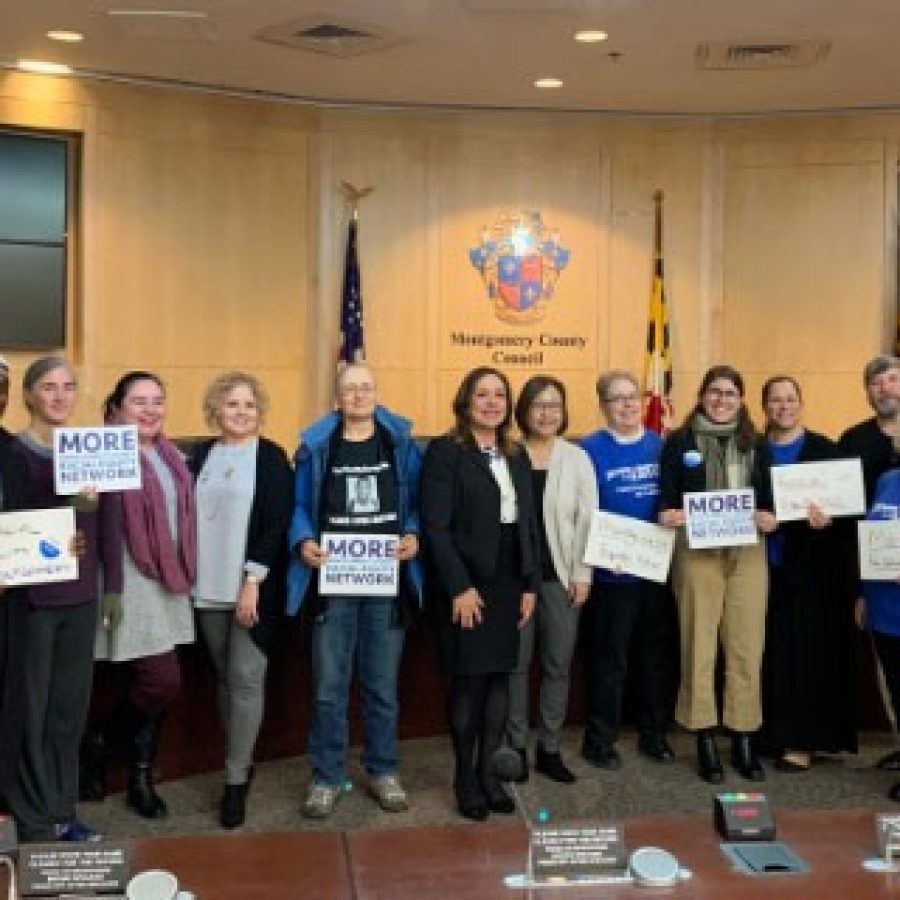Council president worked on legislation for more than a year
Council President Nancy Navarro poses with supporters and social justice advocates after the passage of the county’s racial equity bill
PHOTO BY KATE MASTERS
The Montgomery County Council unanimously passed a wide-ranging racial equity bill on Tuesday — a cornerstone policy for Council President Nancy Navarro, who spent more than a year crafting the legislation.
The bill will establish a countywide racial equity program by mandating equity impact statements for all new bills and budget measures. It will also require county offices to submit plans for reducing inequality and create a new Office of Racial Equity and Social Justice within the executive branch.
The bill mandates racial equity training for all county employees, and establishes an advisory committee with seven county representatives and eight public members.
Each of the eight public members will receive a $2,000 annual stipend for volunteering — an amendment added Thursday at the request of more than a dozen residents and local advocacy groups.
The county has public members on more than two dozen additional boards and commissions, many of which specifically direct that members should not receive compensation. Council Member Craig Rice said he plans to pursue legislation to require funding for all public committee members, leveling the field for other volunteers.
“We’re now embarking upon something that, from a policy perspective, is new for us,” Rice said on Tuesday. “And if we’re looking at this as a change of policy, I think we need to treat all of our boards and committees the same.”
The bill was amended Tuesday to require that public members of the racial equity advisory committee live in Montgomery County — one of several last-minute changes to legislation that Navarro described as an “instrument” for systematically eliminating deep-rooted inequalities.
The most significant amendments broadened the bill to include equity initiatives prioritized by other council members. Rice, who sits on the council’s Health and Human Services committee, amended the definition of social justice to include freedom from health disparities — a move Navarro said would appease community advocates who felt health was not fully addressed in the bill.
Council Member Evan Glass, the first openly gay member of the County Council, also broadened the definition of social justice to cover “sex, including on the basis of gender identity or orientation,” at the urging of several local LGBTQ advocates.
“It helps us defend who we are,” he said Tuesday.
The U.S. Supreme Court is considering whether the pivotal Civil Rights Act of 1964 — which outlaws discrimination based on race, religion, national origin and sex — protects the rights of gay and transgender citizens. The lack of clarity in the word “sex” has led to arguments on whether it can be interpreted to include sexual orientation and gender identity — an internal sense of gender which, for trans people, often does not match the gender they were assigned at birth.
The final bill spans a dozen pages and directs legislators to consider racial equity and social justice at almost every level of government. But local advocacy groups, who heavily influenced the final version of the legislation, still worry that the policy lacks teeth to affect lasting change.
“There’s certainly concern over symbol without substance,” said Hashim Jabar, the interim director of the Montgomery County chapter of Racial Justice Now, who attended the final vote on Tuesday. “It remains to be seen whether the actual realities will change and how past [racism] will be addressed.”
The new bill was influenced by similar policies across the country, including in nearby jurisdictions such as Fairfax County, Va., where leaders adopted their own social and racial equity plan in 2017.
Over the last several years, reducing achievement disparities and grappling with decades of discriminatory racial policies has become a priority for local governments.
The National League of Cities released a municipal action guide for advancing racial equity in 2017. This fall, the Metropolitan Washington Council of Governments — of which Montgomery County is a member — announced a separate program to assist local governments in implementing equity plans.
Navarro, in several meetings leading up to the passage of the bill, emphasized that Montgomery County was taking a unique step in setting its racial equity policy into law.
But real outcomes from similar plans across the country have been difficult to measure. Fairfax County’s policy directs legislators and the local school board to consider racial equity in future decisions, but includes few actionable measures and little in the way of funding.
In Seattle — one of the first cities in the country to implement a race and social justice initiative more than a decade ago — achievement gaps for students of colors have worsened in some areas, despite millions of dollars of funding for racial equity programs in public schools.
Montgomery County is also stymied by a lack of oversight over its local school system. While residents identified educational disparities as one of the most significant local examples of inequity, the county cannot enact or enforce equity policies within Montgomery County Public Schools.
In a working lunch with school board members after the passage of the bill, Navarro specifically addressed equity issues and asked how MCPS was working to implement its own policies. The school system has adopted its own equity and achievement framework, but is grappling with performance disparities between white and minority students and boundaries that remain unchanged since the time of segregation.
MCPS is working on a countywide boundary analysis — possibly the first in the history of the school system, Superintendent Jack Smith said on Tuesday. Board members have not committed to changing school boundaries based on the results from the study.
Still, activists say the racial equity bill takes important first steps in other directions, including requiring equity impact statements for all non-expedited legislation to move forward. That section of the bill won’t take effect until Aug. 1, but it’s an example of a real, actionable policy, said Joanna Silver, a member of Takoma Park Mobilization and Jews United For Justice.
“That and the training requirements are some of the strongest parts of the bill,” she said on Tuesday. “Whether that results in behavior changes on the part of county employees — that’s something that still needs to be measured.”
On Thursday, Navarro took the added step of requiring funding for the bill, a largely symbolic gesture that council members take to signify their commitment to certain pieces of legislation. How much the county will spend to implement the new policy is still uncertain.
A recent budget analysis projected that the new Office of Racial Equity and Social Justice would cost roughly $1.9 million over the next six years. The full economic impact of the bill has yet to be calculated by the county’s Office of Legislative Oversight.






